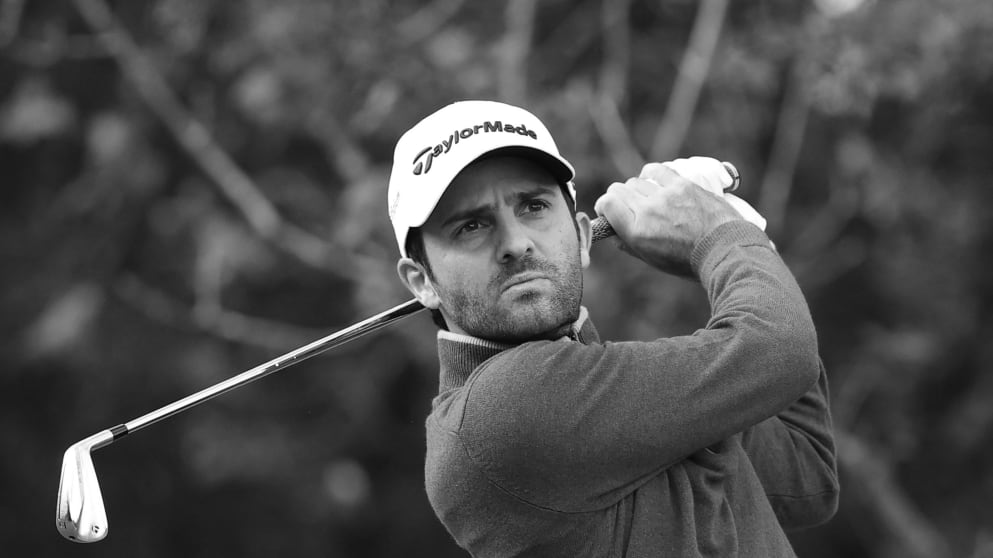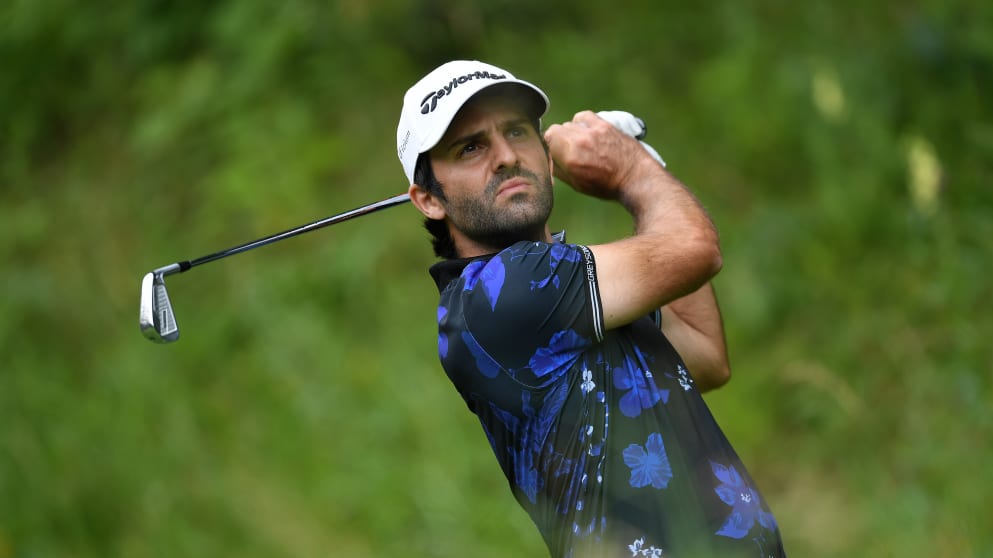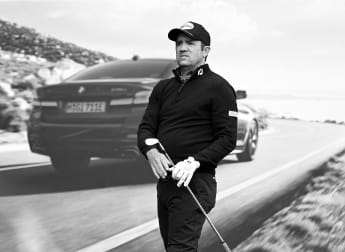In this week’s Player Blog presented by Enterprise Rent-A-Car, Joël Stalter reflects on holding himself up to a high standard, sharing success, and the importance of life beyond the golf course.


I think a lot of people have an image of who someone is as a player, but often people don’t know the humans behind them. Even as players we don’t get to know each other that well on Tour so it can be easy to judge how people act on the course, but I don’t think you can really judge anyone until you know them as people.
At the end of the day we will all have our bad weeks, and our better ones on the course, but as much as golf is important, there is more to life than golf, and that’s a big reason why I think everyone should also focus on who you want to be outside of what people see on the TV, too.
As golfers, everything we do on a daily basis is to get better, but for me that’s not just about improving our game, it’s also about improving ourselves to be better human beings. You can be a great champion on the course but you could be very average off it, and I’ve always thought it’s very important to be both - the best golfer, but also the best human being I can be.
It’s why I’ve always felt that you need to stay true to who you are. In life and in golf, what works for you probably doesn’t work for half the people around you and vice versa, so don’t try to be somebody you’re not, or the player you’re never going to be, just try to be a better version of you as a player and a human everyday. It’s probably one of the biggest things I’ve learned on Tour. When I was struggling a bit more I started looking at other swings and players that were performing well, and it’s almost like you want to copy them, but you can’t. Everyone is unique, everyone is so different that you can easily start looking at the wrong stuff, instead of going back to what’s essential. Sometimes you might be playing badly because of something in your life that you don’t realise is affecting you, rather than something you’re doing wrong technically.

Golf is so much more than your swing, and a lot of the game, and our lives, is based on our mental well-being. If we’re happy in our lives, if we’re functioning well, we’re going to have more chance to be successful on the golf course. It’s a lot more about what’s going on off the course that dictates what happens on it. The life of a professional golfer is a lot more complex that it seems on TV, and every great player has been through some great struggle. You should try to get advice, try to get help with your game, but at the end of the day only you know what is best for you.
I have always held a high standard for myself, but it’s always been based on doing the best I can in every aspect of my life. I was very lucky that I have wonderful parents who made a lot of sacrifices for my brother and I, and I have always felt like I have a responsibility to do my best, because they gave me opportunities they never had as children.
They own a restaurant in France that was near a golf course, which is how I got into the game, and there was a sense of randomness about it because it wasn’t a popular sport in France for kids, but it was more down to convenience that they knew we were safe and close by. They spent a lot of their time taking me to places so that I would have an opportunity to play, and it’s only when I got older that I realised how blessed and lucky I was to grow up with so much love. They have never cared about how I perform, they just want me to be happy, and even though there has never been any pressure, I’ve been motivated by that sense of duty to them since I was a kid.
Quote of the year #truestory #trusttheprocess pic.twitter.com/NGP33cw72H
— Joël Stalter (@JoelStalter21) September 4, 2018
Coming out on Tour is different for everyone, but for me, the hardest thing was actually losing my education. College was probably the biggest experience of my life, going to school 10,000 miles away from home in California, but I was lucky I ended up in a great school surrounded by great people – I always say I’d go back if I could. It’s a period of your life where all you do is try to get better, for you, without any consequence. Whether you win or lose, there was no worrying about Tour cards or getting into another tournament, and I knew that if I didn’t perform well I would still have a great degree, which took a lot of pressure off my chest.
I didn’t know it at the time, but when I graduated I was losing that part of myself that I’d put into studying, and all of a sudden I had all this free time. I put that into golf, which didn’t necessarily help because I would start overthinking, and I began being harder on myself because that was basically all I had left. I’d wonder whether I was good enough, whereas before I wouldn’t have. Part of conditioning myself as a professional was realising I can’t let golf consume me and all of my thoughts, because there’s so much more to life.
A trophy carries dust. Memories last forever 🏆💪🏼 @CalMensGolf #motivation pic.twitter.com/slPsZ4fU8p
— Joël Stalter (@JoelStalter21) March 28, 2019
It’s important for me to have something other than golf. There’s a side of me that’s very data driven and the other side that is very artistic and philosophical. That’s kind of who I am, I could be the guy with a cigar and a glass of wine, or the guy with a spreadsheet analysing the stock market.
I’m not really a car enthusiast (Fun fact i don’t even own a car at the moment). Instead I collect watches. They are actually a big part of my life, and I probably spend more time reading and talking about Horology than I do with golf.
I think I am quite a philosophical person, and I do a lot of reading outside of golf when I’m not playing. I also carry a notebook with me. The intention was to write about golf, but I now write about everything I think is interesting in my reading, ideas I have, and some deep stuff too. It’s important for me, because I’ve always thought if you start writing a plan, you’re committing to something more than just speaking. There’s a sense of responsibility when you start writing things down too, because you’re taking ownership of the words you are writing.
I used it to help recently with two public speaking conferences I did for a couple of companies – one for my sponsor and one for my friend in Switzerland. He felt that there were a lot of similarities between what they do and what we go through as a professional athlete. I thought it was going to be about 20 people and it ended up being 110, and it went great. I’ve always been a helper, and I think if I can try at my own small level to inspire other people, even if it’s just one person, through my experiences – good or bad – I want to do that as much as I can. I’ve always really believed in the value of other people - that’s how we progress as humans.
It’s one of the reason I wrote the first article on my website, about trying to stay optimistic during an unpredictable time. Most of the time you read about players it’s about golf, equipment and a little about life on Tour, and my idea was that instead of writing about results, I’d write about what I was actually feeling. We all have our struggles, and life on Tour isn’t as easy as people think, so I thought I’d write about that and see if I could help inspire even just one person.
My perspective surrounding my game really changed in lockdown, and doing these conferences and writing stuff down really helped cultivate that mentality. At first it didn’t look like there was going to be much of a future for golf for a while, because we didn’t know about the rest of the season and I didn’t really have a category back then – I only had Challenge Tour – and I came out of two years of really struggling. At that time, golf wasn’t important, there was so much going on with the pandemic, the panic, and I was thinking am I even going to have a job next year. That made me realise things are very fragile, and you can’t take them for granted. I realised instead of thinking too much ahead or about future, just enjoy what’s in front of you, and understanding that golf is very important to me but it’s not all my life – and that I could still be happy without it.
I looked at my career with a fresh mind, and it took away the last two years of struggle for me, and I went to Austria with no expectations. When I won I started seeing all of the struggles of the last two years flash before me and I was emotional. Winning in golf is the hardest thing to do, and doing it in tough conditions, seizing the small opportunity in front of me, it was amazing, and it was a moment of proving to myself I could do it. It’s not the path I would have chosen, and I thought my career would go a lot differently when I first got my card in 2017 only to lose it by 2000 euros, but things don’t always happen as you expect them to.

The win has its perks but more importantly it sheds light on the struggles I have been able to overcome little by little the last couple of years. Winning when I had basically no status on Tour, having that opportunity and being able to pull through was amazing. But what was even greater was being able to share that with the people that had helped me get back to where I am. It’s what made me start writing about success and happiness. It’s only true when you can share it with whomever you decide to embark in your journey.
When I won, one of my loyal sponsors told me he went out to do some grocery shopping and had tears in his eyes, same with my coach, everyone was emotional and that made this even more special. You feel like you’ve gathered people to be part of something that is just bigger than yourself, and that’s the beauty of it.
So I want to end this blog with thanks. To my parents and brother, the Team at Taylormade Golf, Jean-Francois Renault (Eficium), Philippe and Pascale Bucheton and all the team at Paris International golf club (PIGC), Didier Moinel-Delalande (Le Mathurin Hôtel), Kenny Le Sager, Marion Duvernay, Matthew Bridge, Donal Scott, Julien Steinmetz and last, but not least, Flora Peuch.












